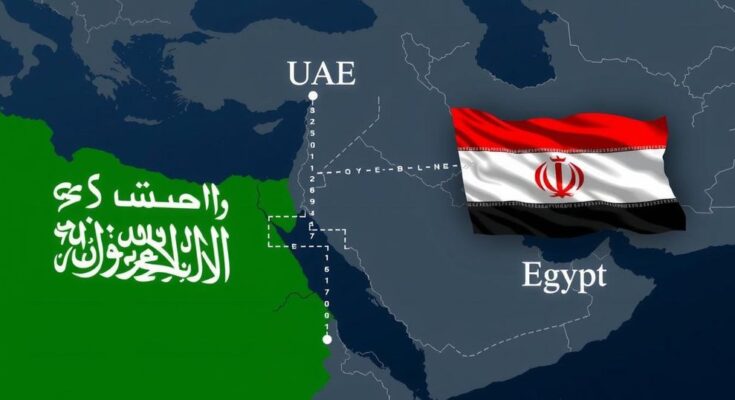Saudi Arabia, the UAE, and Egypt’s recent reactions to Israel’s military strike on Iran demonstrate a significant shift in regional diplomacy, indicating potential realignment towards viewing Israel as a partner against Iranian influence while prioritizing regional stability.
In the contemporary Middle Eastern landscape, where allegiances are in constant flux, the subdued reactions of Saudi Arabia, the United Arab Emirates (UAE), and Egypt to Israel’s recent military action against an Iranian facility offer insightful implications for regional dynamics. Unlike customary condemnations emanating from Arab states directed at Israel, the responses from these nations now possess an intriguing neutrality, suggesting an evolving perspective on Iran’s influence in the region. The United Arab Emirates, while issuing a statement denouncing the military operation against the Islamic Republic of Iran, opted for calls emphasizing “the importance of dialogue and adherence to international law.” This choice of language reflects the UAE’s inclination towards diplomacy and underscores its growing ties with Israel, particularly following the Abraham Accords. Rather than overtly condemning Israel, the Emirati response signals a recognition of Israel’s strategic posture and possibly endorses the rationale behind its security operations. Similarly, Saudi Arabia’s reaction circumvents outright condemnation, branding the assault as “a violation of sovereignty.” Nevertheless, Riyadh emphasizes “the security and stability of the countries and people of the region.” This tempered response indicates a strategic recalibration, balancing acknowledgment of Iran’s sovereignty while maintaining a degree of acceptance towards Israel’s actions aimed at counteracting Iranian threats. This softening of rhetoric portrays a kingdom that seeks to navigate its interconnected interests between regional stability and its historical apprehension towards Israel. Egypt, taking a more expansive approach, echoed concerns over “serious confrontation threatening regional and international security,” thereby calling for a “swift ceasefire” across several conflicts. By redirecting focus onto collective regional stability rather than isolating Israel’s actions, Egypt assumes its traditional role as a mediator, highlighting its vested interest in maintaining peace along its borders amidst the complexities surrounding the Israel-Palestine situation. The unified tone of these statements illustrates more than mere shifts in rhetoric; they point toward a strategic realignment indicative of shared priorities among Saudi Arabia, the UAE, and Egypt. Although these nations maintain their commitment to the Palestinian cause, their current focus centers on mitigating Iranian influence, ensuring regional economic stability, and enhancing border security. This nuanced position suggests a potential reconciliation between these Arab states and Israel, framing the latter not solely as a competitor but as a crucial ally in fostering regional security against a backdrop of escalating Iranian assertiveness. Consequently, what may have once elicited vocal and united condemnation from the Arab world now invites a more measured discourse, showcasing a pivotal evolution in attitudes. The readiness of these nations to convey supportive yet cautious responses defines a new era in Middle Eastern relations where Israel could increasingly be perceived as a partner in the quest for stability, countering Tehran’s regional ambitions effectively, thus altering the geopolitics of the region significantly.
The article explores recent responses from Saudi Arabia, the United Arab Emirates, and Egypt regarding Israel’s military actions against Iranian positions. This analysis is rooted in the shifting geopolitical alliances among these nations, reflective of a broader realignment that prioritizes strategic interests and cooperation against common threats, particularly Iran. The nuanced language and tempered rhetoric from these states signal a departure from adversarial postures and suggest a potential partnership with Israel in maintaining regional stability.
In summary, the measured responses of Saudi Arabia, the UAE, and Egypt to Israel’s military actions against Iran signify a significant strategic shift within the Middle East. Rather than adhering to traditional condemnation, these nations have opted for a diplomatic tone that acknowledges shared interests in countering Iranian influence and fostering regional security. This evolution highlights an emerging dynamic where Israel may increasingly be viewed as a partner among Arab states, thus reshaping the geopolitical landscape in a complex region.
Original Source: www.jpost.com




